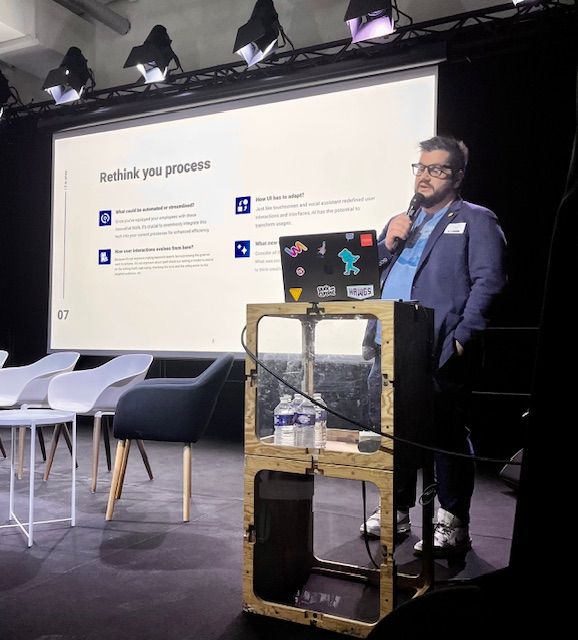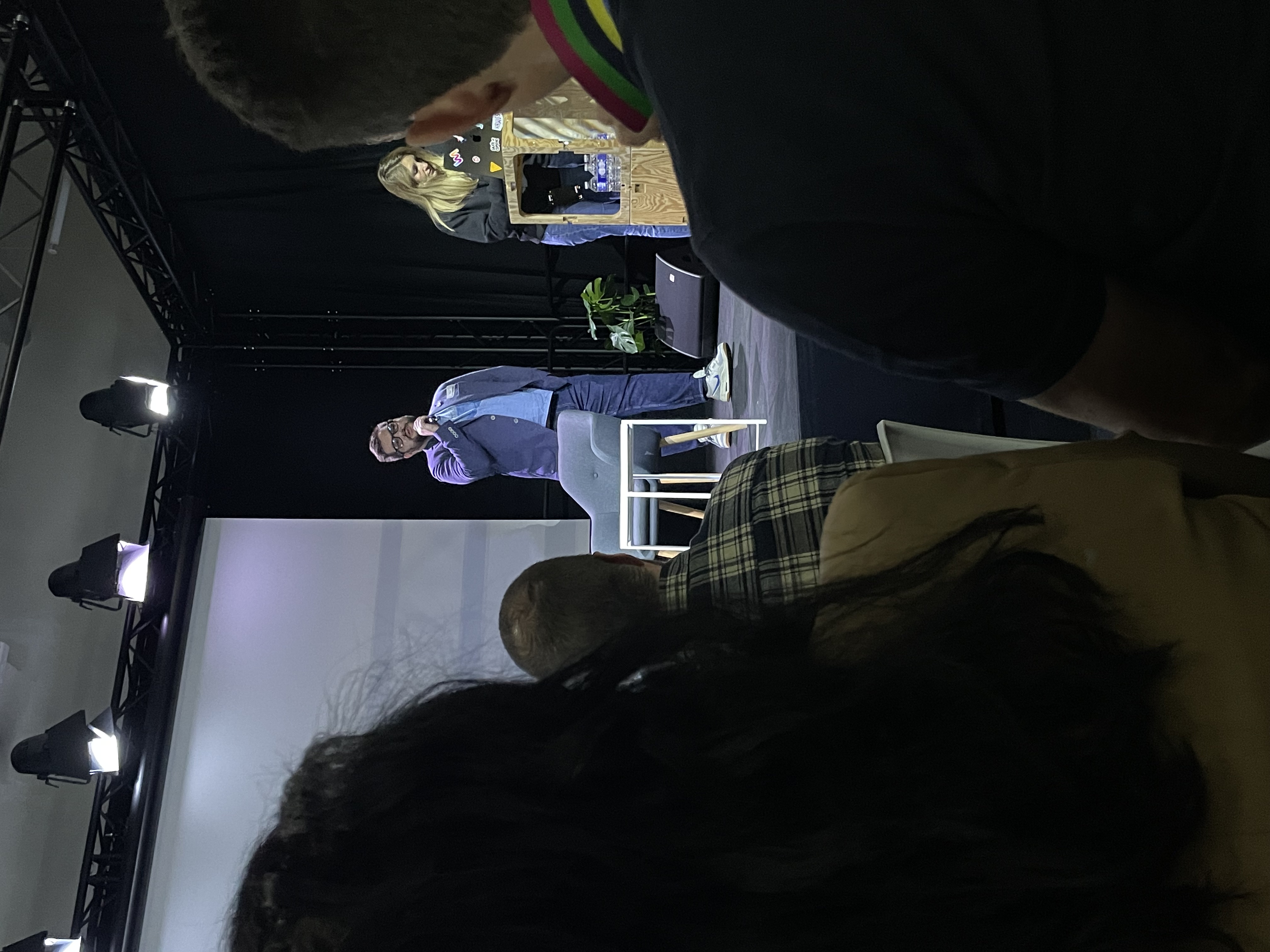Navigating the AI Revolution: Key Insights from UX-Meet's AI Experience Conference
"Is AI going to replace UX designers?" The question hung in the air as I took the stage at UX-Meet's AI Experience conference. The packed room of designers, developers, and innovators waited expectantly for answers. As Innovation Director at Smile, I've witnessed firsthand the anxiety and excitement that AI brings to our industry. But what I was about to share wasn't just another AI hype story - it was a practical roadmap for companies navigating the AI revolution, learned through real experimentation and occasional failure.
My presentation, "How to Fix AI Adoption in Your Company," tackled these concerns head-on. Rather than offering empty promises about AI's capabilities, I shared battle-tested strategies drawn from real-world successes and failures. The room's energy shifted as I revealed how careful experimentation, thoughtful data management, and strategic change leadership could transform AI from a looming threat into a powerful ally. What followed was not just a presentation, but a vibrant exchange of ideas with fellow innovators who shared their own stories of AI integration - both the triumphs and the pitfalls.
A Gathering of Innovators
The "UX-Meet: AI Experience" gathered 200 participants from diverse backgrounds - UX/UI experts, students from 42 School, and IT professionals - all united by a common curiosity about AI's role in transforming UX practices. The event created an intimate setting where experienced practitioners shared their real-world experiences integrating AI into their daily workflows. Rather than dwelling on theoretical possibilities, speakers focused on practical applications, demonstrating how AI tools enhance their teams' capabilities without replacing human creativity and expertise.
A recurring theme throughout the presentations was the emphasis on human-centered design: AI as an assistant rather than a replacement. Speakers shared candid insights about their journey with AI adoption, from initial skepticism to discovering valuable use cases that amplify their teams' potential. The message was clear and reassuring: AI is not here to replace UX professionals but to augment their capabilities, allowing them to focus on the uniquely human aspects of design - empathy, creativity, and strategic thinking.
The atmosphere was electric with optimism as attendees discovered how AI could streamline routine tasks and open new possibilities for innovation in UX design. This wasn't just another technical conference; it was a gathering of professionals eager to embrace AI as a powerful ally in their creative process, while maintaining the human touch that makes UX design truly impactful.

My talk: How to fix AI adoption in your company?
My presentation focused on the nuanced journey of adopting AI within organizations. The talk, titled "How to Fix AI Adoption in Your Company," underscored the importance of a strategic and measured approach to integrating AI technologies. Drawing from my experience leading the "LLM4Dev" study at Smile - a six-month experimental initiative to select and implement AI tools for developers - I demonstrated how careful experimentation leads to tangible results. This pilot, which is now in its rollout phase, has already shown measurable gains in developer productivity and provides clear metrics on return on investment.
I dedicated a significant portion of the presentation to the critical aspect of data management, drawing from our extensive experience implementing AI tools across Smile's teams. Through numerous projects and initiatives, we've developed robust protocols for data sharing and privacy that have become cornerstones of our AI strategy. I emphasized two crucial aspects: first, the importance of thoroughly understanding the implications of sharing data with AI tools, and second, maintaining complete transparency through regular monitoring of terms of service and usage conditions. These foundational practices ensure our teams can leverage AI capabilities while maintaining strict compliance and protecting sensitive information.
Lastly, I addressed the vital role of change management in AI adoption. By fostering a culture of innovation and providing comprehensive training, organizations can empower their workforce to effectively utilize AI tools. Our own rollout experience at Smile serves as a testament to how this approach enhances efficiency and aligns with strategic objectives.
Key takeaways
- Experimentation is Key: Take time to explore various AI tools through pilot phases without rushing into decisions. This helps identify the tools that truly add value and align with your company's goals.
- Start with the Obvious: Begin AI adoption with clear and straightforward use cases to gain traction and reduce barriers, even if the initial ROI is modest.
- Data Management: Be vigilant about data privacy and understand the terms of service of AI tools. Transparency with users and clients about data usage is crucial.
- Change Management: Invest in acculturation and training for all employees to ensure a solid understanding of AI's potential and limitations. This will foster a culture of innovation.
- Share and Learn: Engage in open discussions about your AI experiments to position your brand as a leader in innovation, facilitating valuable exchanges with peers.
- Consider the Bigger Picture: Look for AI solutions that offer benefits at every level of the organization. Integrate them into daily processes for enhanced efficiency.

A Journey of Discovery: Personal Insights from the Event
Reflecting on the "UX-Meet: IA Experience," I found myself truly inspired by the wealth of knowledge and creativity shared by the speakers. One of the standout moments for me was Cesar Miguel's (CPO of 42 School Paris) engaging live demonstration on using AI to not write code. This experiment-driven approach highlighted the fun and innovative spirit of AI and showcased its potential to empower individuals and small teams with limited resources. This, applied to discovering some of the mecanics of how 42 School is working (like their economy of P2P reviews), was particularly fascinating.
Another highlight was Cyrille Magnetto (VP Innovation at AXA), whose presentation was packed with insightful use cases and feedback on implementing Generative AI within his team. His depth of knowledge and enthusiasm for the subject were contagious, and I found myself wishing his talk could continue for hours. Cyrille's work is something to monitor closely, and I hope to bring him to Luxembourg for a future AI conference.
I must also commend all the other speakers who contributed their expertise and perspectives, enriching the event with diverse insights. A special thanks to my colleagues at UX Republic for organizing such a well-executed and thought-provoking affair. Their efforts in bringing together a community of innovators made the "UX-Meet: IA Experience" a memorable occasion.
"UX-Meet: AI Experience" demonstrated the transformative impact of AI on UX design. The event highlighted the importance of thoughtful AI adoption to maximize its benefits. The exchanges confirmed the essential role of collaboration in the evolution of AI technologies. I'm enthusiastic about AI's potential to enhance user experience and optimize resources for small teams. I plan to apply these learnings in my work and maintain dialogue with this dynamic community to collectively address future challenges of AI in UX design.

Comments